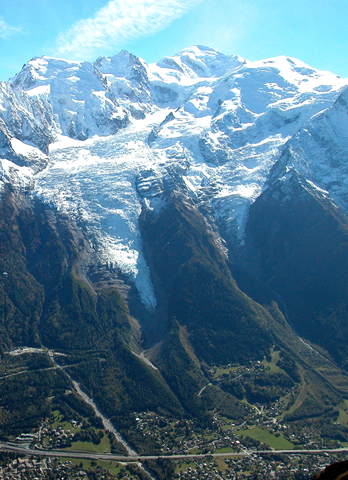In Alps, glaciers retreat as climate debate goes on – ‘In 40, 50 years what are we going to say to our next generation? ‘Oh, it was great! You should’ve been here’’
By Bill Weir
9 April 2015 (CNN) – The world’s glaciers are disappearing. Climate change skeptics are not. The people who study our oceans and skies worry about both of these phenomena. But in wide swaths of 21st century America, the argument is still stuck on what to call the other side. “Denier” can also describe those who reject the Holocaust, so some who refuse to believe that human behavior is warming the planet prefer the label “skeptic.” But scientists are de facto skeptics, and many resent that word being hijacked by people who sneer at their work and accuse them of fraud. They suggest “denialists.” The other side counters with “fearmongering warmists.” Meanwhile, the glaciers don’t care. They just melt. After reading countless scientific studies on our warming world, I’ve always sought proof through the eyes of people who really know their ice. And after reading countless refusals and rebuttals from libertarian bloggers, I’ve always wanted to visit their annual convention and better understand how they think. So this episode of “The Wonder List” takes us from a Heartland Institute pow-wow in Las Vegas to the glaciers of the French Alps. It is a quest to challenge “rock stars” of the denialist/skeptic camp and then challenge my feeble mountaineering skills with the best alpinists in the world. […] “95% of the world’s glaciers that are monitored currently are retreating. And it is happening so fast,” he tells me. “It’s 20 times faster than any natural temperature change before human beings became so active.” My mountain guides, Sebastien Rougegre and Fleur Fouque listen and nod. The professor’s statistics confirm what they have seen in the glaciers above their town and in the ice beneath their boots. “When I came here as a boy, the (Bossons) was several hundred meters below,” says Seb, was we dig our axes into the ice. “At the moment we can still enjoy it but in 40, 50 years what are we going to say to our next generation? ‘Oh, it was great! You should’ve been here.'” [more]


“In 40, 50 years what are we going to say to our next generation? ‘Oh, it was great! You should’ve been here”.
Uh, no. In 40 or 50 years, it’s highly doubtful there will be any humans left. If there are any survivors still around, they’ll be cursing this generation non-stop, and rightly so.